Kazushige Abe talks about his own works in Thailand (Part 1)
Kazushige Abe (writer)
To commemorate the publication of the Thai edition of Akutagawa Prize-winning writer Kazushige Abe's representative works IP (Individual Projection)/NN (Nipponia Nippon), the Japan Foundation, Bangkok invited Abe to Thailand in March 2014 and held a talk session between Abe and Thai writer Uthit Hemamoon as well as a reading session, as one of the official events at the 12th Bangkok International Book Fair 2014.
During his stay in Thailand, Abe was interviewed by a Writer, a Thai monthly literary magazine with a circulation of 3,000 copies a month, in which he openly talked about his path to becoming a writer, the Thai translation of his book, what he felt as an Asian writer and other topics. In this article, we present an excerpt of the interview to our readers.
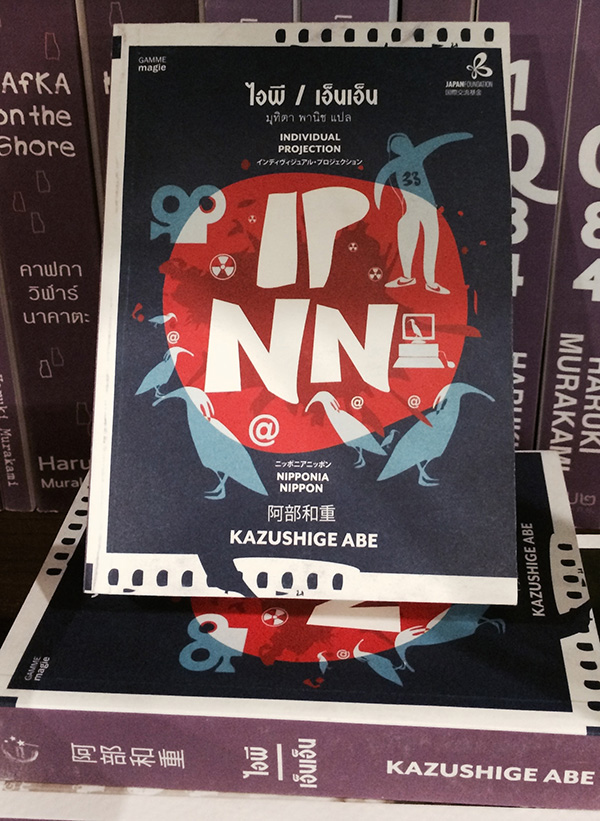
Encountering books: The path to becoming a writer
――I would like to make today's interview a kind of "introduction to Kazushige Abe" for Thai readers. You were born in Jinmachi in Yamagata Prefecture. Were you brought up in an environment surrounded by a lot of books?
Abe: Yamagata is in a region of Japan known as Tohoku, and it is a very rural countryside (laughs). The internationally renowned drama Oshin is set in Yamagata and is very popular.
I was born and raised there in Jinmachi, in Higashine City. Because my family runs a bakery, my home is located in the middle of a shopping district. When I introduce myself, I often say that my life was formed within a few meters in radius from my home. In front of my house there was a bookshop, and a bank next to it, and next to the bank it was a movie theater.
Having the bookshop right in front of my house, books were things easy to get in my daily life. However, I was never a bookworm during my childhood. It was opposite, in fact. I hardly read any novels. Instead, I indulged in manga. My father was quite fond of reading, so there were books at home, but I myself did not really have a habit of reading. So in my boyhood, what I was interested in were movies and manga.
――You said you did not read a lot, but are there any books you remember in particular?
Abe: As you might expect I sometimes went to the bookshop that was right there and picked up books about movies. For example, Also sprach Zarathustra (Thus Spoke Zarathustra), composed by Richard Strauss, was used in 2001: A Space Odyssey, a film directed by Stanley Kubrick. The title itself is impressive. I had been wondering what it meant, and found a book with the title at the bookshop (laughs). It is where I first saw the name Friedrich Nietzsche. I tried reading it in the bookshop but did not really understand what it was about. So I could remember writers' names and book titles through movies.
Other than that, one book that I actually bought myself and read was something like a theoretical book about the martial arts by Bruce Lee, called Tamashii no Buki (Soul Fighting). Eventually, I mentioned it in detail in my debut novel. Bruce Lee developed a martial art known as Jeet Kune Do, and there are dojos (martial arts training halls) around the world where a lot of people learn it. A theoretical book about this Jeet Kune Do had been translated and was being sold.
I was a big fan of Bruce Lee, so I just had to read this book from cover to cover. I heard that Bruce Lee studied philosophy when he was at a university in Seattle, and the book had quite a lot of philosophical descriptions. Consequently it was extremely difficult to understand, but I did my best to read and understand it and then tried to write a similar book emulating it.
――You wrote it?
Abe: Yes (laughs). I thought I had to create something like Jeet Kune Do in the track of Bruce Lee. I tried to write something but ended up copying it word for word (laughs).
――The title Amerika no Yoru (Day for Night) is taken from Francois Truffaut's film, but when I opened the book it was about Bruce Lee. I wondered what was going on. So your works were influenced a little bit by things like that?
Abe: Yes, you are right. So as I said at the beginning, my work is mostly defined by the various things I experienced and observed in my childhood, and in some respects I have lived without getting outside that much up to now.
Up until some point, I had received critical opinions that my novels were childish or brattish. I think these opinions are correct to some extent, and my works have not changed in this way even now.
I believe brattishness is not something unique to me but has been specific to Japan's culture after a certain point of time. In that respect, I think that I have partially captured the nature of Japanese post-war subculture in my own way. In fact, I published a non-fiction about this brattishness, titled Yosho no Teikoku (Empire of Infancy) about three years ago. If people in Thailand are interested in reading it, I would be very happy to accept an offer for the Thai edition (laughs).
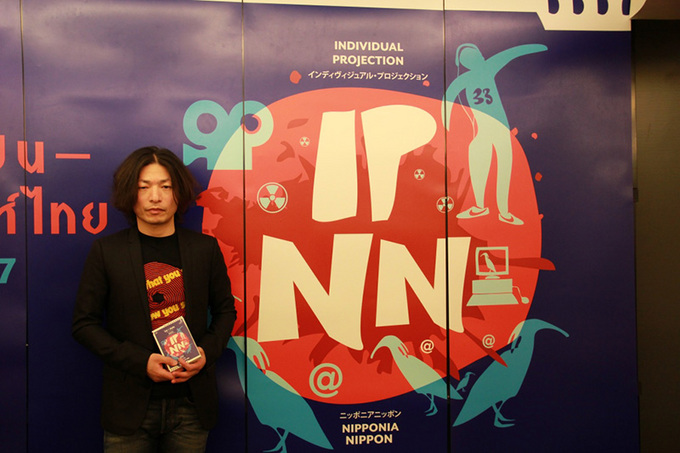
――I heard that you went on to a film school. I have a feeling Thai readers would like to hear why you ended up becoming a writer after studying at a film school. Would you mind talking about that a little?
Abe: I was desperate to make movies, so I dropped out of high school and went to a vocational film school. At the time the head of the school was Shohei Imamura, a famous film director, and I enrolled in the school because it offered the advantage of learning directly from people who were actually working in the field.
The school had various faculties but in the first year everyone attended the same classes together. In one of these classes, each student tried to write a scenario and screenplay. So we were given the assignment of writing a scenario, and once I started writing, I was hooked. Before that, I had never reached the stage of completing a work on my own, in any format. I had not shot any film yet, and neither had I written anything to completion in text. When I first tried writing something in the form of a scenario I found it enjoyable or challenging in my own way. I thought it would be great, if I would be able to easily write what I want to express without any costs.
I scarcely read any novels or books before that. At most I would read a book "because that musician mentioned it" or "because it was made into a movie." So I only read a handful of books really, like works by Yukio Mishima and other writers. I thought that everyone who went to a film school must like movies. However, there were not so many movie fans, in reality. Instead, there were a variety of people including those who knew a lot about literature. Some of my close friends knew a lot about literature and they recommend me to read some books, which gave me a chance to know Kenzaburo Oe, for example.
Then, I came to have more interest in novels and literature. On top of that, I found myself enjoying writing as a form of expression, and this made me become so much familiar to literature.
Having said that, it is not as though I could leap into the world of novels. Anyway, I wrote as many scenarios as I wanted separate to what I was doing in class, and then got my friends to read them. I did that repeatedly. Even after I finished the course, my plan was to write scenarios and submit them to scenario competitions.
As it turns out, however, because scenarios are written with the expectation that they will be made into movies, the ideal format for a scenario is a simple one. Directors have no need for over-detailed descriptions. All that is required is, simple scene descriptions, supplementary descriptive words for actions, and the lines. In my case, though, I wrote a scenario as if trying to release all my expressive desires, as a result of that, what I was writing rapidly came to look nothing like a scenario. One day, I realized that. Then, I had to do something considering that my scenario would be rejected even if I submitted it to a competition. I thought that novels were a better medium to host my stories.
At that time I was reading quite a few books myself. I was also reading books on film criticism in order to deepen my knowledge about films. Prior to that, I often read books written by Nagaharu Yodogawa, Japan's most renowned film critic. I also read books by Shigehiko Hasumi because I wanted to learn about film criticism. He was a significant presence for me and I was enlightened by Hasumi's criticism, which triggered to deepen my knowledge of literature and films.
And a story for a novel also sort of began to take shape, so I decided to have a go at writing it. I started with the idea of separating a channel of expression into two formats novels as a way of expression through writing, and scenarios as a way of expression through images. In that respect, I just wrote my debut novel Amerika no Yoru as it is (laughs).
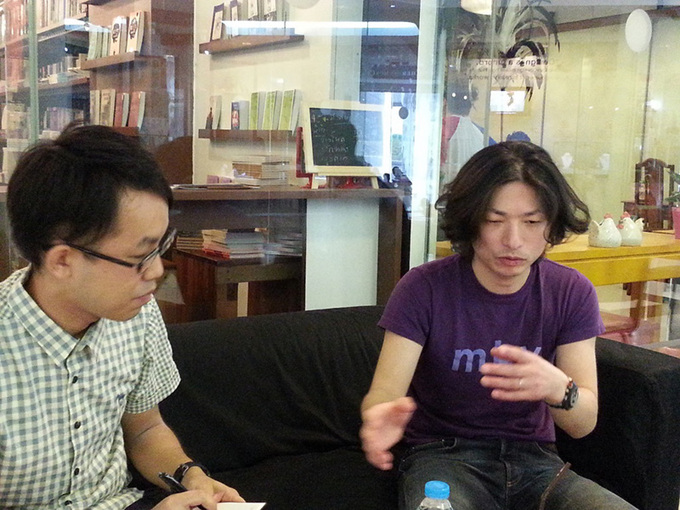
――Is there any novel that especially you remember among the novels that you read at that time?
Abe: Pure literature seemed to be an unfamiliar genre for someone like me who had not studied hard. I was biased or had a prejudice that pure literature was highly formal and full of moral lessons or things like that.
Then, my friend introduced Oe's early works to me, and in particular when I read Kojinteki na Taiken (A Personal Matter), which tells the story of the young man Bird and juvenile delinquents, I realized, "Hey, he is actually writing about people not so different to us." So I was 18 or 19 when I realized I had been wrong to think of pure literature as something only associated with "academic study." I could not feel like that when I read Mishima, possibly because his books were too sophisticated.
In fact if you read a lot of Oe you find his work is also extremely bookish, by which I mean formal and scholarly. However, reading his early works, such as the story about Bird, I knew that he depicted a sense of 1960s street style. I read a variety of books after realizing that literature deals with matters like that contrary to my expectations. When the unabridged version of Naked Lunch by William S. Burroughs or works by Jean Genet came out, I was willing to read them, for example. I also tried reading some science fiction. Anyway, I was seeking out books that seemed a bit odd.
――Did you try to read whatever you like because you did not have a background in what you describe as "academic study"?
Abe: I just read books without learning the fundamental literary history, so my knowledge about literature is somewhat imbalanced. There are many missing parts in my reading experience. I have taken an ill-balanced approach. What I mean is that I did not read all the books written by one writer while reading all written by another.
――What did you do during the period from when you started to write novels to your debut?
Abe: After completing the film course, I started living off part-time jobs. I worked in an area called Shibuya first, a location which is written in Individual Projection. At that time there was a place called the Seed Building, which was managed by the Seibu Department Stores, and on the top floor there was a multipurpose space known as Seed Hall. At first, I worked for Seibu for three months as a contract employee. I wanted to work at Seed Hall, but was not assigned to where I had hoped to move so I quit in three months and got a job at a film production. A friend of mine happened to be working as an editing technician at Toei's educational films unit and he told me I could probably get a job there straight away. So I made educational films, PR films for traffic safety, films for junior high-school student councils and so on. After all, I became unable to be there all the time because I was shooting my own film outside my job, and so I quit that job as well. Then, I started to work as a part time worker at Seed Hall. By the way, I finished shooting my own film that I just mentioned but failed to secure staff, and the project fell apart and ended up in the air.
After I started working at Seed Hall, I submitted my novels to Gunzo, a literary magazine. I was given a chance for my debut on my third attempt, America no Yoru.
――You submitted them to Gunzo all along?
Abe: Only to Gunzo.
――What was the reason for that?
Abe: I was very conscious that I was an outsider. For example, reading criticism written by Hasumi, or various literary critics including big names like of course Kojin Karatani, (Akira) Asada, (Naomi) Watanabe and (Hidemi) Suga, I realize that an educational background about fundamental literary history is extremely important.
I felt that trying to suddenly enter the world of literature without such a background would be presumptuous indeed, but I nevertheless wanted to write novels, so in order to gain my "license," I submitted my works to Gunzo whose selection committee included Karatani and Meisei Goto whom I respected and believed would be very strict. I should not write novels without obtaining approval from these two. This strong belief drove me to submit my works only to Gunzo three times. Somehow or other, my novel America no Yoru got their tentative approval (laughs). And I have managed to work for 20 years since then.
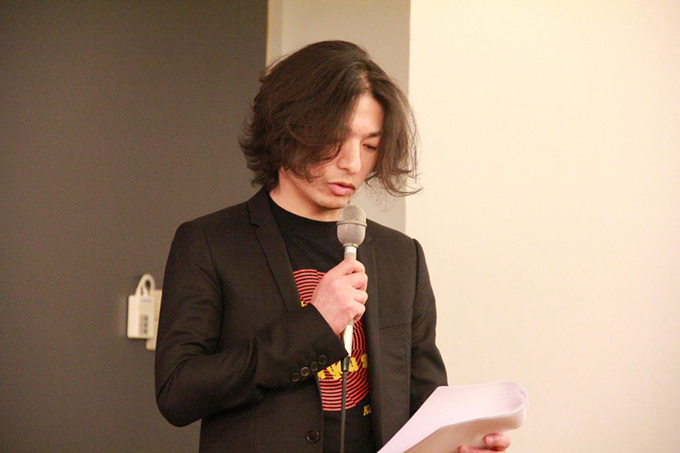
Reading session held in Thailand
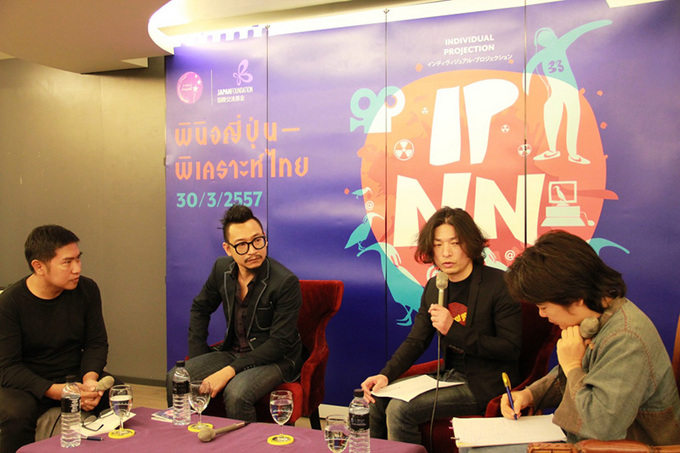
Talk session with Thai writer, Uthit Hemamoon
Interviewer: Sho Fukutomi (Thai literature researcher)
Excerpted from an interview in issue 25 of Writer, Thai literary magazine, June 2014
Continues to "Kazushige Abe talks about his own works in Thailand (Part 2)"
Kazushige Abe
Kazushige Abe was born in 1968. He graduated from the Japan Institute of the Moving Image. His debut novel, Amerika no Yoru (American Night), won the 37th Gunzo Prize for New Writers. Subsequently, Mujo no Sekai (Heartless World) won the 21st Noma Literary Prize for New Writers, and in 2004, Shinsemia (Sinsemilla) won both the Ito Sei Prize and the Mainichi Publishing Culture Award. In the same year, he also won the 132nd Akutagawa Prize for Gurando Finare (Grand Finale). In 2010, Pisutoruzu (Pistols) won the 46th Tanizaki Jun'ichiro Prize. Recent works include Kuesa to 13-banme no Hashira (Quasar and the 13th Pillar) and Shikaku (Square).
Keywords
- Literature
- Film
- Philosophy/Religion
- Japan
- Thailand
- Japan Foundation Bangkok
- Bangkok International Book Fair
- Uthit Hemamoon
- Yamagata Prefecture
- Oshin
- Stanley Kubrick
- Richard Strauss
- Nietzsche
- Bruce Lee
- Jeet Kune Do
- Seattle
- Philosophy
- Subculture
- Shohei Imamura
- Yukio Mishima
- Kenzaburo Oe
- Nagaharu Yodogawa
- Shigehiko Hasumi
- Pure Literature
- William S. Burroughs
- Jean Genet
- science fiction
- Shibuya
- Seibu Department Stores
- Toei
- Kojin Karatani
- Akira Asada
- Naomi Watanabe
- Hidemi Suga
- Meisei Goto
- Gunzo
Back Issues
- 2022.11. 1 Inner Diversity<3> <…
- 2022.9. 5 Report on the India-…
- 2022.6.24 The 48th Japan Found…
- 2022.6. 7 Beyond Disasters - …
- 2021.3.10 Crossing Borders, En…
- 2020.7.17 A Millennium of Japa…
- 2020.3.23 A Historian Interpre…
- 2019.11.19 Dialogue Driven by S…
- 2019.10. 2 The mediators who bu…
- 2019.6.28 A Look Back at J…

